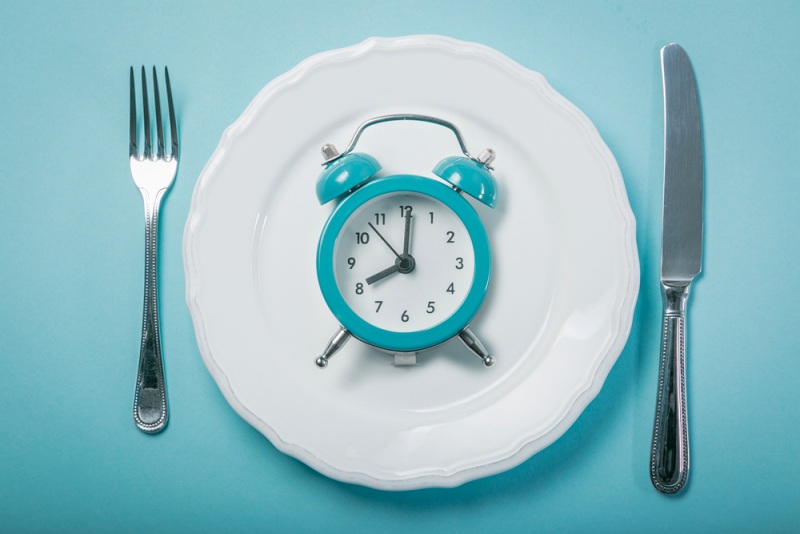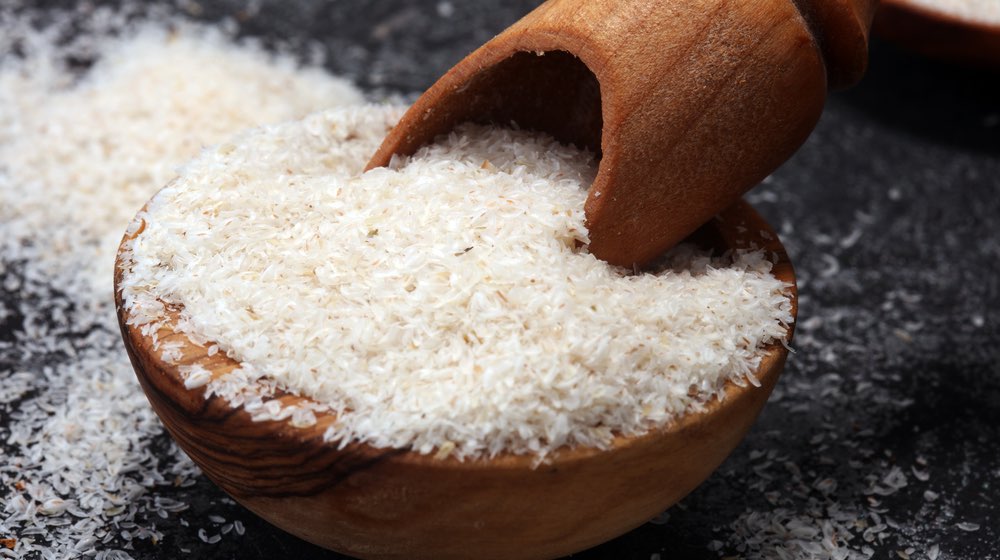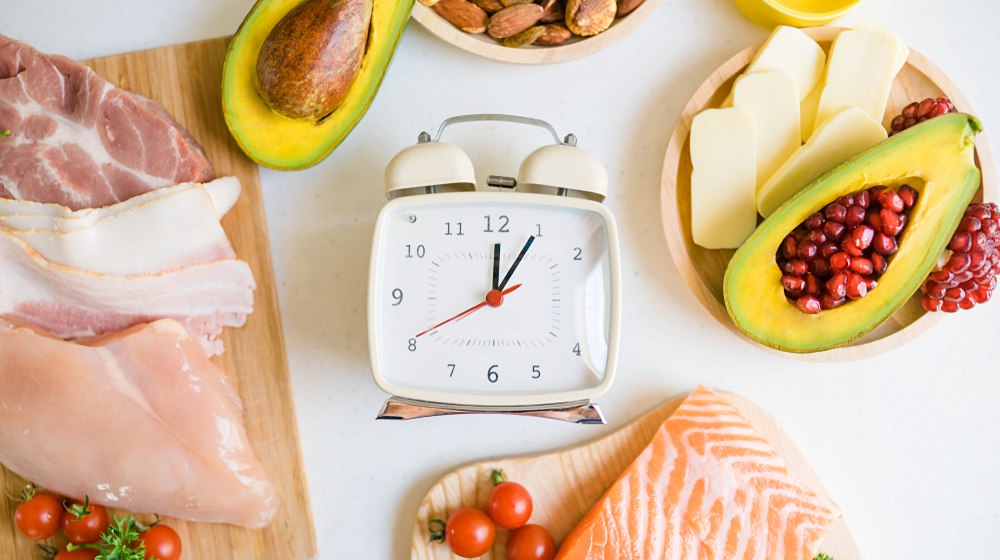Do you know the benefits of intermittent fasting for women over 50? It may help with weight loss, improve insulin sensitivity, and boost heart health.
If you can't wait to discover the secrets to losing weight, continue reading. We'll break down the fast facts on intermittent fasting.
RELATED: 12 Superfoods To Boost A Healthy Diet
In this article:
- What Is Intermittent Fasting?
- What Are the Types of Intermittent Fasting?
- How Does Intermittent Fasting Work?
- What Are the Benefits of Intermittent Fasting for Women over 50?
- What to Eat during Intermittent Fasting
- Is Intermittent Fasting Safe for Women over 50?
What You Should Know About Intermittent Fasting for Women over 50

What Is Intermittent Fasting?

Intermittent fasting (IF) is the opposite of calorie-restricted diets.
Calorie-restricted diets limit how many calories you can consume in a day.
On the other hand, IF focuses on restricting how much time you eat within a certain period. You don't consume any calories during your fasting period. And on your non-fasting period, you can eat like you usually would.
Simple, right? You can argue that this simplifies dieting, and monitoring your adherence is easier. You don't need calorie counting apps and to calculate how much you've consumed. All you need is a watch.
What Are the Types of Intermittent Fasting?

There are three ways to do intermittent fasting.
- 16:8 – In this approach, you can eat within an 8-hour period and fast for the following 16. This is a daily schedule, and you may decide on your own what time to starting eating and when the fasting begins.
- 5:2 – In a 5:2 IF schedule, you fast for two consecutive days and eat normally on your non-fasting days. On your fasting days, limit your intake to around 400 calories.
- Alternate day fasting – Alternate-day fasting is much more forgiving as you only fast every other day. And even on those fasting days, you can still eat but only 25% of your daily calorie intake.
Which schedule you should try depends on which is the most sustainable and healthy for you.
Because of the fast-paced lifestyle in this day and age, you might already be fasting unintentionally. The only adjustment you'll need to make is to set a schedule.
How Does Intermittent Fasting Work?

The power of intermittent fasting comes from metabolic switching.Your body runs on carbohydrates. When you eat carbs, your body converts this into glucose (blood sugar). Glucose is energy food for your cells.
The pancreas then releases insulin, which is in charge of getting your cells their fill of glucose.
And just like when you order too much take-out, insulin also stores glucose into fat cells for later.
But IF insists that we use these stores sooner than later.
When you're low on sugar, your body dips into your fat stores to use as energy. This is called metabolic switching.
Intermittent fasting results in metabolic switching. And the result of this could lead to other health benefits.
Metabolic switching may also influence substances, proteins, and molecules that have a hand in aging. More on this later.
Intermittent fasting only limits the period you can eat within a day or week. And this may be why it became a fad so quickly—because it doesn't limit what you eat. It sounds like the easiest and most satisfying diet, right?
If you don't watch what you eat and only when you eat, aren't you prone to bingeing?
Unfortunately, it's this common train of thought that has some doctors brushing off IF so quickly.
However, it also inspired some research that led to some great discoveries. Let's uncover the hidden potential of intermittent fasting.
What Are the Benefits of Intermittent Fasting for Women over 50?
1. Intermittent Fasting for Weight Loss

Weight gain and obesity are common among older adults. Whether it's because you live a more sedentary lifestyle or aren't able to exercise as much as before, you may notice that your pants don't fit as well as before.
And post-menopausal women are more likely to accumulate fat around their midsection. The drop in your estrogen levels may leave you with an apple-shaped body.
But while it is common, it is also avoidable.
Intermittent fasting could be as effective in weight loss as popular diets.
Many studies show consistent results, suggesting that IF may contribute to significant weight loss. However, some studies showed that it also led to a drop in muscle mass.
Experiment with intermittent fasting to improve your eating habits. But consider adding a bit of exercise to optimize the health benefits.
Some studies show that exercise boosts the effects of IF.
RELATED: Keto Paleo Diet | Why We Should Do This and Foods to Eat
2. Intermittent Fasting for Improved Insulin Sensitivity

When you eat continuously (say at least three meals a day), your insulin levels don't have an opportunity to subside. Where there's glucose, there will be insulin too.
Unfortunately, prolonged elevated levels of insulin could lead to insulin resistance. And insulin resistance is a gateway to type 2 diabetes.
Scientists believe that fasting will give your insulin levels a chance to subside and lower your risk of type 2 diabetes.
This is could be why intermittent fasting for women over 50 could be especially beneficial.
Postmenopausal women are at higher risk of insulin resistance. As a result, they are also at risk of type 2 diabetes.
Because fasting gives your insulin levels time to subside IF may help improve insulin sensitivity.
In addition to a low-sugar diet, IF could be ideal for those that are prediabetic. That is, of course, after you discuss this with your doctor.
3. Intermittent Fasting for Heart Health

Fasting could help improve markers of heart health, such as:
- blood pressure
- resting heart rate
- HDL and LDL cholesterol levels
- triglycerides
- glucose
- insulin resistance
You may feel the heart-protective benefits of IF within just 2-4 weeks of your diet. But if you want to keep reaping its benefits, you have to keep at it. If you go back to your normal diet, you can expect the benefits to diminish after a few weeks.
So if you're considering IF, also think about whether this is the most sustainable diet for you.
But if you're already the type to leave the house without breakfast, just schedule your meals. Your lifestyle might already be a perfect fit for IF!
4. Intermittent Fasting to Lower Inflammation

Inflammation is your body's response to irritants, attacking potentially harmful substances or objects.
Yes, it's great that your immune system does its job at protecting your body. But chronic inflammation could also lead to diseases.
Intermittent fasting could improve symptoms of inflammation-related diseases like:
- asthma
- multiple sclerosis
- arthritis
Studies reveal that fasting could help your body and cells adapt better to stress. Intermittent fasting results in a more resilient body. One that could potentially stand up to oxidative stress and inflammation.
And that could lead to healthy aging!
Keep in mind that research about IF is usually done on animals. Human trials also usually involve younger overweight subjects. There are no studies done specifically on intermittent fasting for women over 50.
So while the research is still in the works, do your best to eat healthful foods and get some exercise.
What to Eat during Intermittent Fasting

Most fasting schedules require you to consume zero calories during your fasting periods. Some schemes will only ask you to lessen the number of calories you consume.
On schedules where you can't have calories at all, stick to water, coffee, and tea.
Water is calorie-free, while coffee and tea contain virtually no calories.
But to be calorie-free, they should be sugar-free and milk-free.
Drinking your coffee and tea plain will also allow you to maximize the health benefits of both!
Pack yourself a tumbler filled with coffee or tea. When you're feeling peckish, take a sip! Having a full tumbler next to you helps you say no to temptation.
If you know that you don't eat well (think fruits and veggies), it might be time to adjust your palette.
The issue with fasting is that some people might end up binge-eating or become malnourished.
So on your non-fasting days, focus on getting all the essential vitamins and minerals your body needs.
The National Institute on Aging lists some minerals women over 51 need to get from their diet:
- vitamin A (eggs, milk, fruits, veggies)
- vitamin B1 (pork, fish, whole grains)
- vitamin B2 (green leafy veggies, organ meats, lean meats)
- vitamin B3 (nuts, whole grains, fish)
- vitamin B6 (fish, potatoes, fruits)
- vitamin B12 (poultry, milk, meat)
- vitamin C (red fruits and veggies)
- vitamin D (fish, milk, fortified cereals)
- vitamin E (nuts, green leafy veggies)
- vitamin K (green leafy veggies, fruits)
- calcium (milky, green leafy veggies)
- magnesium (green leafy veggies, whole grains, nuts)
- potassium (fruits, veggies, coffee)
- sodium (no more than one teaspoon per day)
- folate (fruits and veggies)
Is Intermittent Fasting Safe for Women over 50?

Unique approaches in IF keep popping up because one size does not fit all.
The best way to maximize your diet and your newfound openness to bettering your health is to upgrade your lifestyle completely.
Build your muscles and make them stronger. If you're not diligent enough to count your calories, at the very least, make each one count.
A healthier lifestyle may also include intermittent fasting.
Ease your way into intermittent fasting and alternate your fasting days. Listen to your body. And most of all—listen to your doctor.
Rethink this diet if you are:
- pregnant
- take medication that you need to take on a full stomach
- diabetic or pre-diabetic
- have food-related disorders
Also, keep in mind that this may not be the best diet for a growing kid. So if you have a family, this may be a diet that has no place on the dinner table.
While it may be safe for women over 50, it may not be ideal for the elderly population. Long-term studies on elderly subjects are lacking. And older adults are prone to malnutrition and muscle loss.
At this age, you need to pay extra attention to what's on your plate.
Good nutrition is key for healthy aging. And when done incorrectly and without proper guidance, fasting could lead to undernutrition and a compromised immune system.
If you already have a healthy weight and waistline, also consider other health-promoting diets.
The DASH diet is geared towards heart health. The MIND diet was designed to improve cognitive function. The Mediterranean diet focuses on promoting a healthy eating pattern over strict restrictions.
Check out this video to discover the best foods to eat during intermittent fasting:
Intermittent fasting may lower your blood sugar and assist in weight loss. It may also lead to a lower risk of chronic diseases, a healthier heart, and optimal health.
Be thoughtful when deciding what to eat during intermittent fasting. While its main focus is restricting the times you eat, do your best to fill up in healthful foods on your non-fasting days.
Keep in mind the age-old adage. An apple a day keeps the doctor away! While the mechanics of IF do their magic just by keeping to a timetable, enrich your diet with nutrient-rich meals.
Intermittent fasting for women over 50 could be great for slowing the sands of time when done right.
Do you think intermittent fasting is the best option for women over 50? Share your thoughts with us in the comment section below!
Up Next:
- Emotional Detox | Everything You Need To Know
- 4 Simple Strategies That Can Help You Live in the Moment [PODCAST]
- Kidney Detox | 7 Ways to Detox and Cleanse Your Kidneys Naturally
If you’ve got the gift of keeping healthy and sharing this knowledge through writing, click here if you want to write for us.
Please stay connected with us on Facebook, Pinterest, Instagram, and Twitter. Join our community here and Feel Better, Look Better and Live better with us.
Trending
Tongue Color | 7 Scary Tongue Color Meanings
Lecithin Benefits and Side Effects: 10 Surprising Truths
Get Updates
SIGN UP FOR OUR NEWSLETTER TODAY

Best Multivitamin for Men | Top 10 Best Multivitamins for Men 2022

Lecithin Benefits and Side Effects: 10 Surprising Truths

Related

Best Multivitamin for Men | Top 10 Best Multivitamins for Men 2022

